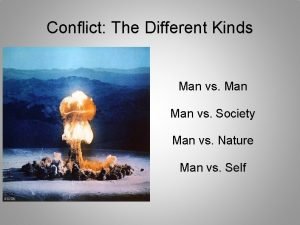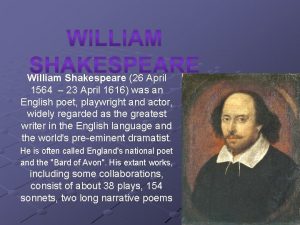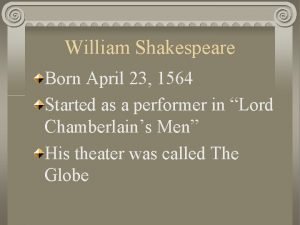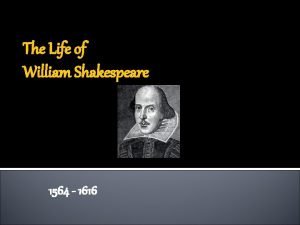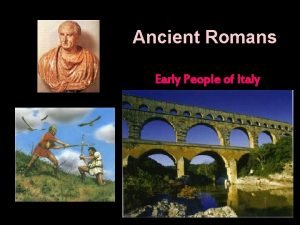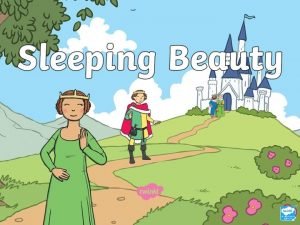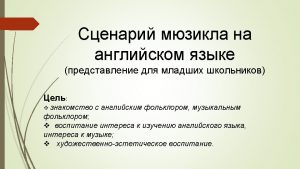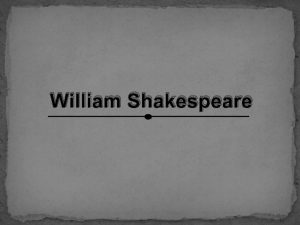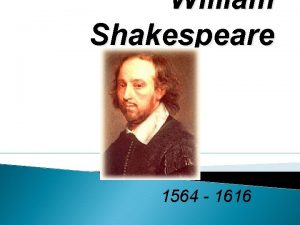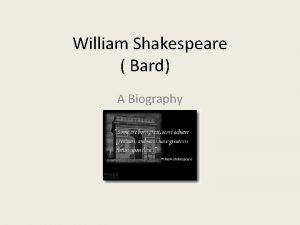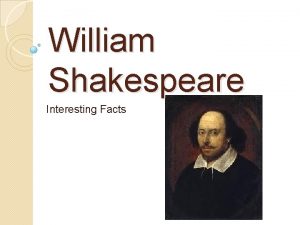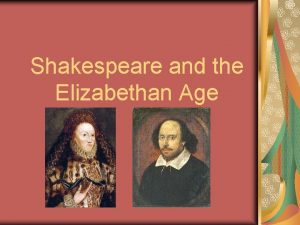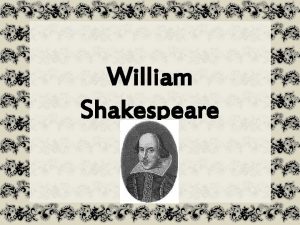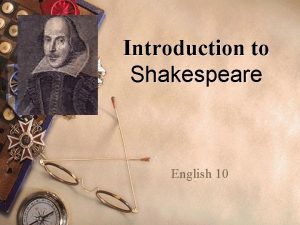The Man Known as William Shakespeare Lived April



















- Slides: 19


The Man Known as William Shakespeare • Lived April 1564 – April 1616 in England • Married in 1582 and had 3 children • Around 1590, he left his family and went to London (actor & playwright) • Favored by Elizabeth I (ruled 1558 – 1603) & James I (ruled 1603 – 1625) – James I was a patron of Shakespeare’s acting company and of all the plays Shakespeare wrote during his reign • Wrote 39 plays and 154 sonnets

• Not much is known about Shakespeare’s life because of the lack of biographical information • Did he really write all those plays and sonnets? – Francis Bacon and the Earl of Oxford are most suspected of being the real writers – Had a modest education therefore it is believed he simply wasn’t smart enough – Most Shakespearean scholars believe Shakespeare is the true author

A History Lesson • Shakespeare wrote during the Renaissance and the Elizabethan period: – Renaissance: the activity, spirit, or time of the great revival of art, literature, and learning in Europe beginning in the 14 th century and extending to the 17 th century, marking the transition from the medieval to the modern world – Elizabeth I was a big part of how/when/why the arts and literature flourished during this time – Drama was the principal form of literature during this age and plays became more secular (about real life) – Primarily written for the entertainment of the court

• The Globe was originally built in 1597 -1598 in London – 3 tiers of gallery – Huge success!!! • Shakespeare had a stake holding in theater • The Globe is burned down in 1613 and rebuilt in 1614, referred to as Globe 2 – back in business! • Puritans demolish the Globe and plays are not allowed to be performed • In 1660, King Charles II allows theaters to open again but the Globe is not rebuilt Rebuilt in the 1990’s in exactly the same way and in the same manner

o The Groundlings (a. k. a. the commoners) – standing room only – “The Pit” o The Gallery – could sit on a cushion and stay out of the rain o See and Be Seen Section – Royalty and Nobility

When in a play. . . • Only men were permitted to perform • Boys or effeminate men were used to play the women • Costumes were often the company’s most valuable asset • Costumes were made by the company, bought in London, or donated by courtiers

• Shakespeare is written in Early Modern English • Shakespeare’s plays are meant to be acted out and read aloud Shakespeare: Original Pronunciation

• Written for King James I (formerly of Scotland, now England) in 1606 – Macbeth reflects the relationship between Shakespeare and the King • Set in Scotland to pay homage to the King’s Scottish heritage – James I is a descendent of Banquo

The Tragedy of Macbeth Cont. ’d… • Not a very complex play, but it is definitely the most powerful and emotionally intense • Shortest and bloodiest of all of Shakespeare’s tragedies • Issues in text that are still relevant today: peer pressure, the difference between right and wrong, ambition (how far is too far), unhealthy relationships, and suicide

• Macbeth – protagonist; King Duncan’s most ambitious and courageous army general in Scotland; viewed as a hero at the onset of the play for his success in battle – Ambition to become king corrupts him causing him to murder King Duncan • Lady Macbeth: – Wife of Macbeth; dark force behind her husband’s evil deeds – As ambitious as her husband • Three Witches: – Hags who can predict the future for Macbeth; also called the weird sisters; Weird is derived from the Anglo-Saxon word wyrd, meaning fate. The three witches are also a reference to the three goddesses of fate (Hesiod)

• Macduff: – Scottish general, suspects Macbeth of murdering the king – Macbeth has his family murdered – Swears vengeance • Banquo – Army general; good, loyal friend of Macbeth – Suspects Macbeth in Duncan’s murder – An actual ancestor of King James I • Fleance: – Son of Banquo • King Duncan: – King of Scotland – honest and good king – murdered by his cousin Macbeth – Sons: Malcom (eldest son and Prince of Cumberland) and Donalbain (youngest son)

• Lady Macduff: – Wife of Macduff • Siward: – Earl of Northumberland; general of the English forces • Ross, Lennox, Menteith, Angus, and Caithness: – Scottish noblemen • Porter – Drunken doorman of Macbeth’s castle • Rest of the Characters: – Hecate (Witch 4): Mistress of the witches’ charms and queen of Hades; referred to as the Queen of the witches


• Def. “Man of high standard who falls from that high because of a flaw that has affected many” Aristotle • A tragic hero must be: born into nobility, endowed with a tragic flaw, doomed to make an error in judgment, responsible for their own fate, and realize at some point that they have made an irreversible mistake and therefore face and accept death with honor. • Macbeth is one of the most famous examples of the tragic hero

• • • So what really happens? Good guy goes bad Guy wants power Married to a pushy control freak She wants power Kills people- LOTS of people Gets power Gets paranoid (a. k. a. goes crazy) Ticks off a lot of people Want more power! Kill! Gets what’s coming to him in the end


The Scottish Play • It is believed to be bad luck to even squeak the word ‘Macbeth’ in a theatre • Legend has it you will lose all your friends involved in the production—horribly • The Simpsons Say Macbeth

“Life’s but a walking shadow; a poor player, That struts and frets his hour upon the stage, And is heard of no more: it is a tale Told by an idiot, full of sound and fury, Signifying nothing. ” - Act V; s. 5 Macbeth 2015
 Man vs man meaning
Man vs man meaning Shakespeare april 23
Shakespeare april 23 April 1564
April 1564 William shakespeare lived
William shakespeare lived April 23, 1564
April 23, 1564 William shakespeare retirement
William shakespeare retirement Etruscan symbols
Etruscan symbols William shakespeare is often called the world’s greatest
William shakespeare is often called the world’s greatest Once upon a time there was a house with a man,
Once upon a time there was a house with a man, Once there was a king
Once there was a king There live a certain man
There live a certain man Once upon a time there lived an old man and an old woman
Once upon a time there lived an old man and an old woman When william shakespeare was born
When william shakespeare was born Othello webquest
Othello webquest Why is william shakespeare called the bard
Why is william shakespeare called the bard Shakespeare biography timeline
Shakespeare biography timeline Who was shakespeare
Who was shakespeare William shakespeare pictures
William shakespeare pictures William shakespeare family tree
William shakespeare family tree Fun facts about william shakespeare
Fun facts about william shakespeare
